Scicon Aerowatt Sunglasses: was Mark Cavendish wrong?
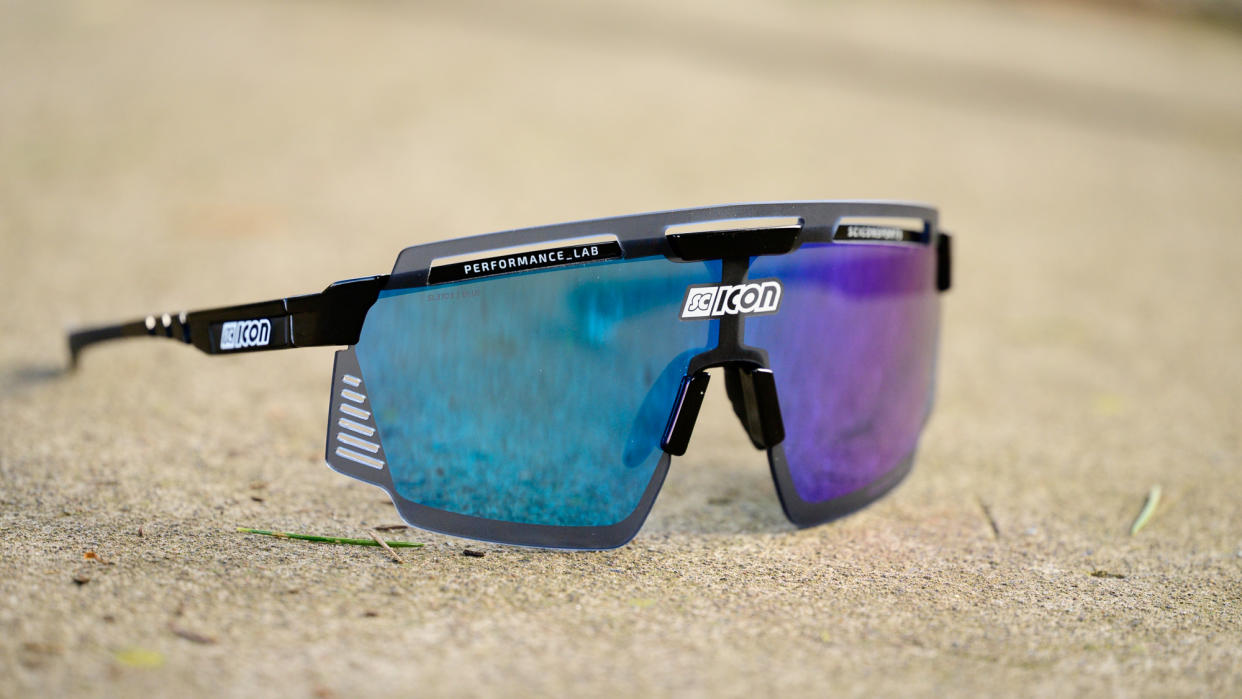
- Oops!Something went wrong.Please try again later.
I'm a tech guy though, and as much as anything else I've been wondering about Scicon sunglasses. We included some of its models in our list of the best cycling sunglasses, but it's been winter and I hadn't worn them in a while. As the days have become warmer I've been out testing some of the best aero helmets and was in need of bold glasses to match the style. As I looked through the options I had, the Scicon Aerowatt jumped out as a definite match. If you have also found yourself feeling curious about the brand of glasses Tadej Pogačar wears but Mark Cavendish doesn't, keep reading to see what this specific model, the Aerowatt, is like.
Tech specs: Scicon Aerowatt Sunglasses
Price: €220 / $230
Weight: 34g as tested
Colour options: Frame options are Gloss Black/White/Crystal and lens options are Multimirror Blue/Red/Bronze/Silver or Photochromatic with clear included
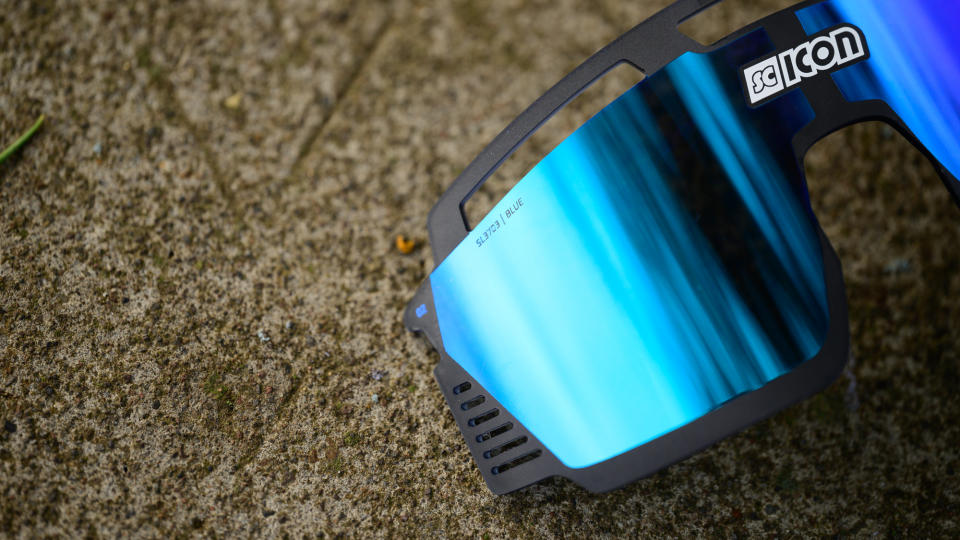
Design and aesthetics
The Scicon Aerowatt sunglasses are some of the most extreme glasses I have. For one thing, they are huge. My tape measure shows 140mm temple to temple and that space is almost entirely dominated by the lens. That matches with another massive pair of glasses I've tested, the Roka CP-1x but even those glasses pale in comparison if you check the vertical measurement. At 65mm tall, the lenses on the Aerowatt dwarf nearly everything I can find. Only the outright goggle-style lenses of the POC Devour are bigger.
Unlike the POC glasses though, the Aerowatt isn't rounded and bubbly. The lens is a massive shield but it's all angles and cuts. From every direction, there's a detail and it always looks in motion. Things like the sharp edge and series of cuts that sit just outside of the field of view make sure to drive home the point as does the segmented detail in the arms.
When it comes to the colours available, they seem to have a sharp edge as well. There are a total of 15 combinations but they are a repeat of three frame colours. Choose black gloss, white gloss, or clear, then pair up red, blue, gold, or silver mirrored options with VLT (visible light transmission) ratings of 15%, 11% for the blue I have, 17%, and 12% for silver. There is also a photochromatic option if you need more flexibility than simply swapping between a chosen colour and the included clear.
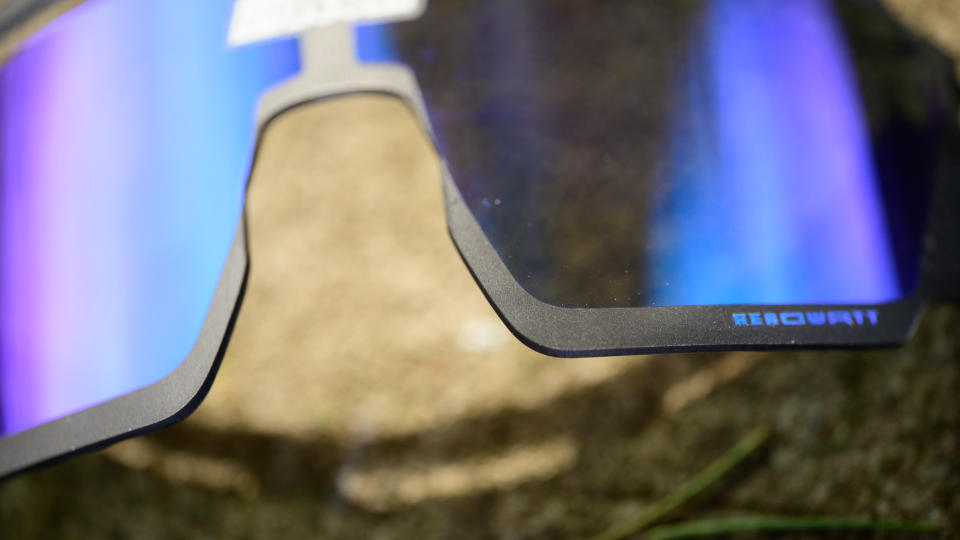
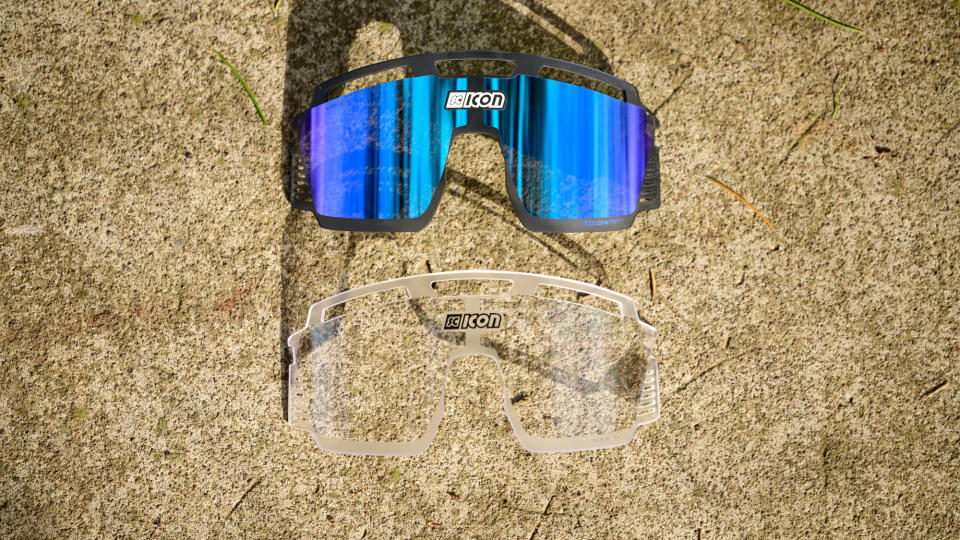
Although none of the lenses has polarisation (not really a benefit on the bike anyway), they do offer 100% protection from harmful UV A/B/C rays as part of the SCN-PP lens technology. Bigger picture, SCN-PP is a collection of features mostly related to the "unique polycarbonate" construction. According to Scicon, the material will withstand impact loads "over 30 times higher than CR 39 (plastic) lenses" and 60 times higher than glass lenses. At the same time, the particular material will handle blocking the UV spectrum without additional coatings.
One thing worth noting about the lenses is the guarantee that Scicon offers. The scratched lens replacement program is exactly what it sounds like. "The Scicon Sports Scratched Lens Replacement Program covers all damages of your lenses from use and lasts a lifetime." You only need to be the original purchaser with proof of purchase from Scicon or an authorised retailer, and up to twice a year you can pay shipping and handling to get new lenses in the event of an accident. Not only is the guarantee unheard of in the industry but it points to design details that go beyond style.
While fashion might be important, seemingly every fashion detail is also a thoughtful performance detail. One of the most obvious is the matte, opaque, coating that edges the entirety of the lens. It does lend to the futuristic look but it's also designed to help soften reflections. Further helping with that endeavour, the upper part of the frame is behind the lens to block light. Then, in front of the frame, the lens has large cuts to allow airflow.
A detail that can’t be labelled as a function of fashion is the material the frames use. Instead of a traditional plastic Scicon uses a “natural based bio-frame” which uses vegetable oil. Although many of the sustainability drawbacks that exist with plastic remain, starting with oil from plants does reduce the carbon footprint with seemingly no drawback. The resulting Grilamid TR90 material looks, feels and reacts just like any other plastic but rather than pulling carbon from fossil fuels, it redirects carbon that plants have stored. Again, it’s hardly perfect but it is a small step worth mentioning.
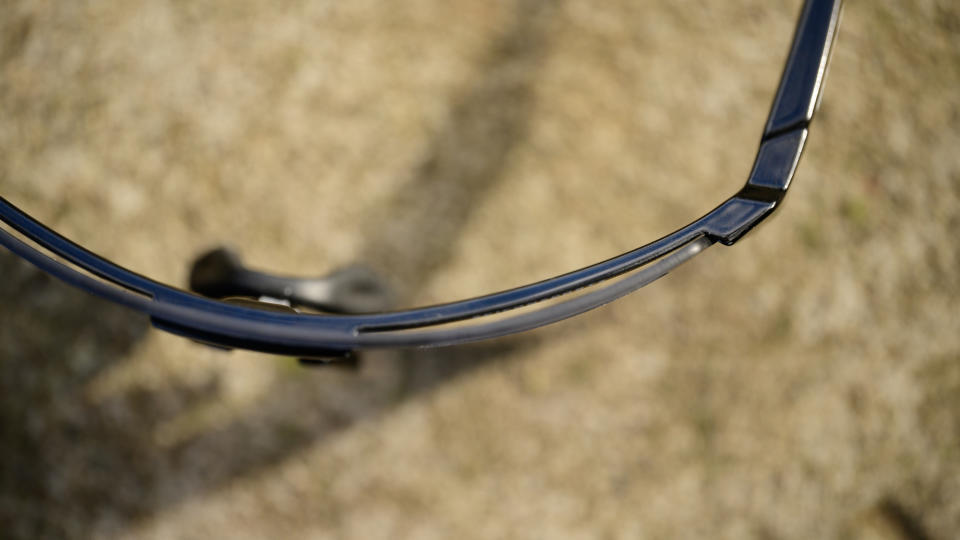
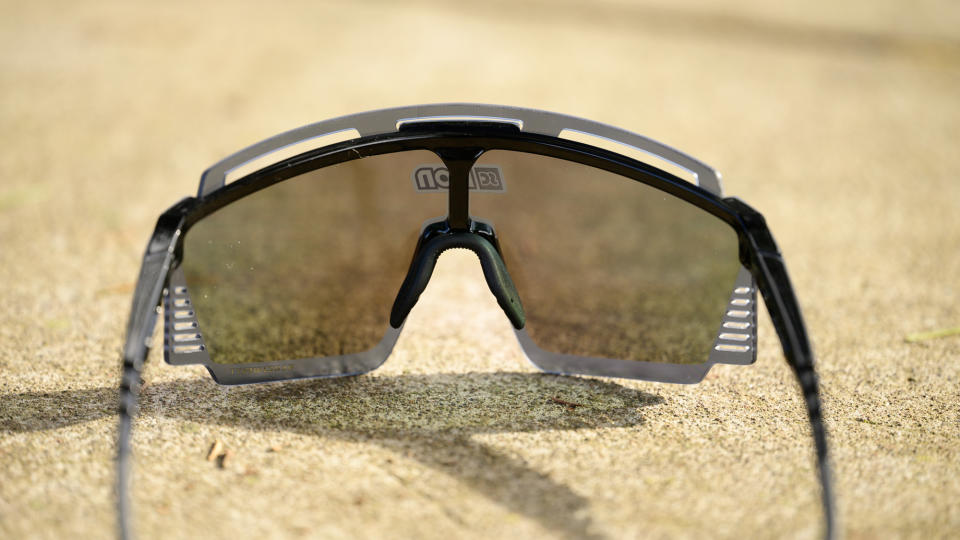
Performance
Although the Astana/Cavendish news had me checking my Scicon sunglasses, it was something else that got me wearing a pair. It wasn't about a need for different sunglasses because of performance reasons but rather a need for just the right sunglasses to work with a brash aero helmet. After all, helmets and sunglasses are two peas in a pod and I've been changing helmets almost every ride as I test options for our best road bike helmets buyers guide. Not only do the two need to physically work well together from a fit perspective but I love when they work together stylistically.
The brasher the helmet I was wearing, the brasher I wanted my glasses to be and the Scicon Aerowatt glasses definitely fit the bill. These are look-at-me type of sunglasses and if you are looking at something from our list of the best aero helmets, you might want to go all in. Something like the Limar Air Speed helmet is all angles and vents too and the Aerowatt is a perfect match. The Smith Ignite helmet is even more like an all-out TT helmet and almost demands a brash pair of glasses like the Aerowatt.
Just like the design section though, there is more to the glasses than style. You can tell one of the things that the designers worked hardest on was making sure internal reflection and light behind the lenses weren’t an issue. They did such a good job that I initially felt like there was nothing to report and did not notice any particular advantage from the anti-glare features. As with many of the best designs, the absence of an issue is hard to catch. It was only when I was later asked about light behind the lenses that it occurred to me not every pair of glasses does such a good job on this detail.
Another feature that is also somewhat unremarkable initially is the contrast of the lenses. This time though, it remains unremarkable even after reconsideration. Contrast doesn’t feel like an issue exactly but since we are discussing Oakley a bit, the Prizm lens technology is a standout while the mirrored blue Scicon lenses are not. The through-the-lens colour is actually a light brown and in use, it’s totally fine with no visible distortion but not a standout. The real standout feature is actually the “space vent” at the top.
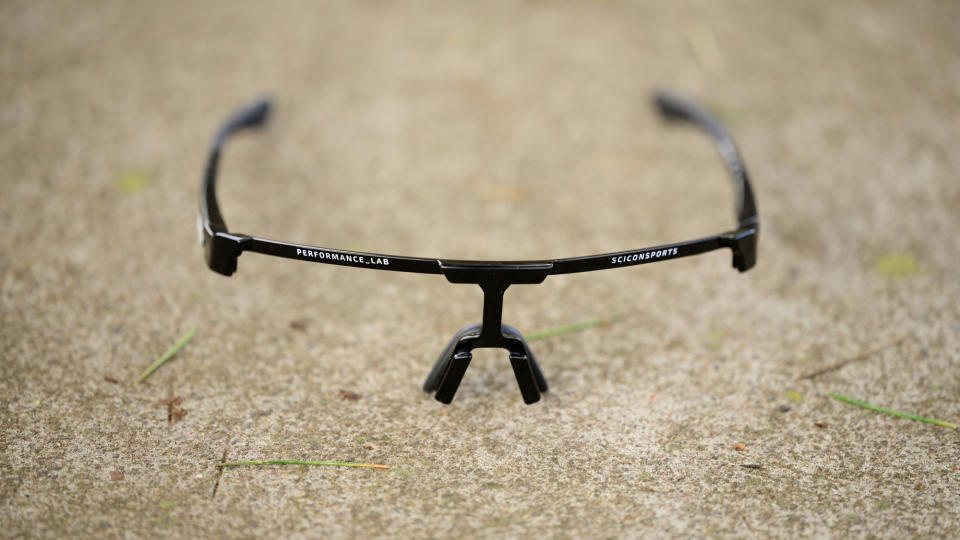
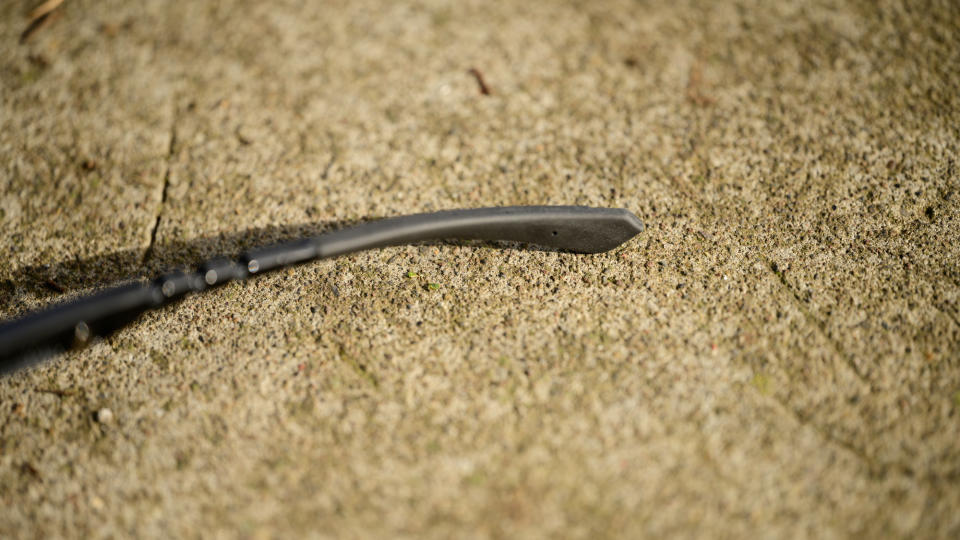
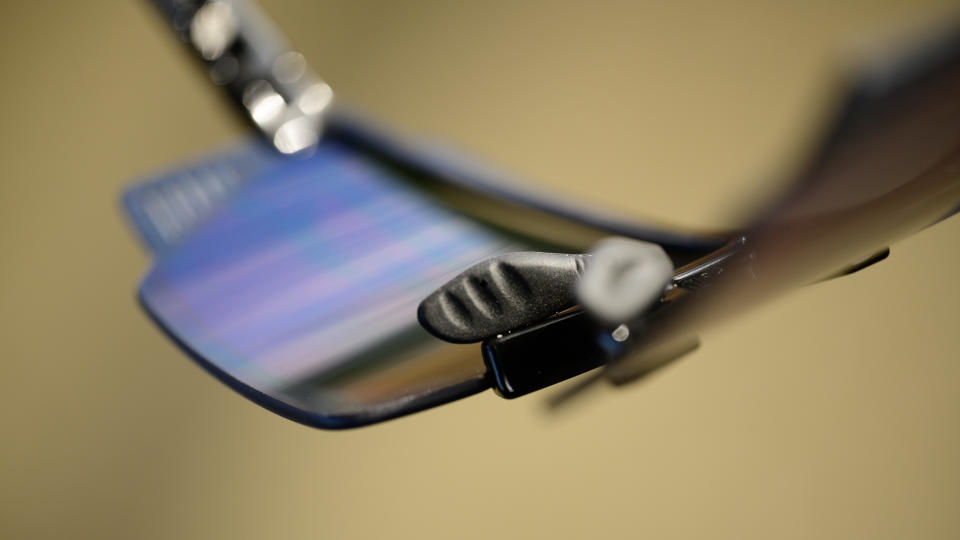
Scicon discusses the space vent in terms of keeping light out while allowing air in. As mentioned already, keeping light out is effective but not super noticeable and the same is true of the anti-fogging capabilities. There's plenty of airflow and I had no problem with fogging but I also wasn't testing these while fully bundled up for winter. If you do find yourself needing to test them in that situation, there are clear lenses in the box and swapping them out is a simple process.
Instead of airflow down, what I like about the space vent is the way it channels air up. The placement of the frame across the vent leaves a generous opening across the top of the frame. That space above allows air to come through the lens and hit your forehead to help dry the front padding in a helmet. The effect is even more noticeable because the Aerowatt lenses are big enough that they almost feel integrated with the helmet. More than any other single feature, the venting through the lens that stays out of your field of vision is what I noticed while spending time in the Aerowatts.
Of course, the expected part of any sunglasses review is climbing performance. It's not hot enough just yet to talk about climbing on the hottest summer days and how the lenses deal with the inevitable sweat and low airflow. I do appreciate that if I decide it's worth trying to clean the lenses in one of those situations, I don't have to worry about accidental scratches. Otherwise, though, I can tell you that they do stay in place, even when staring down at the pavement.
Despite staying in place though, they don't feel as solid as I'd like. At 34 grams the Aerowatt is light but competitive. The story the scale doesn't really tell is that while 34 grams is competitive, about half of that is the weight of the lens. There's very little structure in the frame and even with a small amount of adjustability at the end of the arms, it feels pretty flexible. In use, it doesn't seem to be an issue but it is something I notice as I switch between different glasses. On the upside, it's easy to get the glasses situated between a variety of helmets and the Openrun Pro headphones I almost always have on.
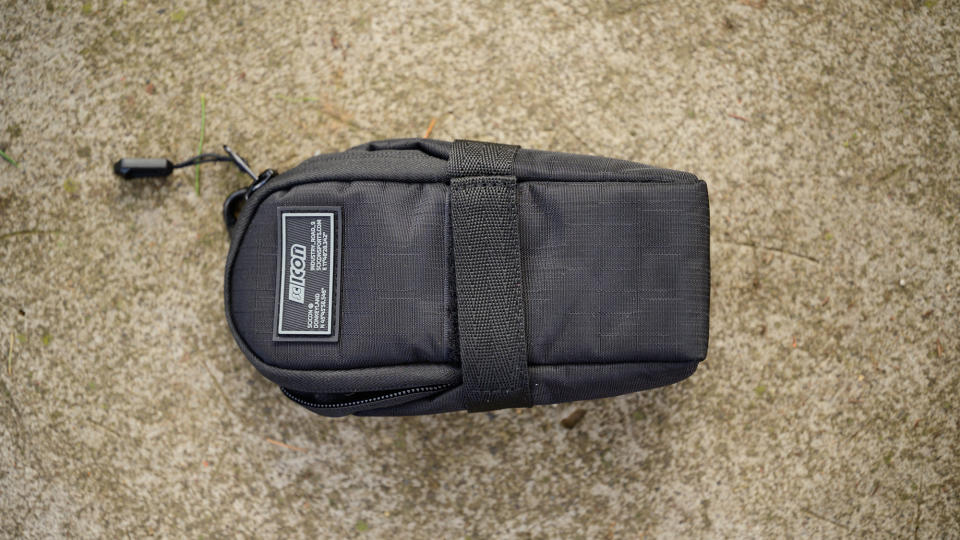
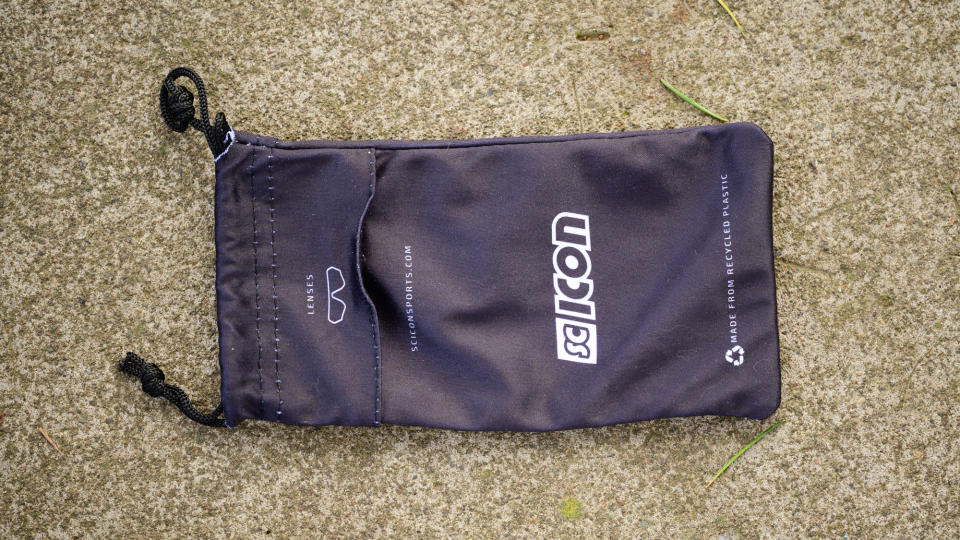
Verdict
There's not a lot I can say here beyond that I love the style of the Scicon Aerowatt sunglasses. All the design details that Scicon says have specific performance reasons for existing, they also look cool. When I put on just the right kit, grab the fastest aero helmet I can find, and go out to absolutely hammer the Aerowatt glasses are my current companion.
The lenses are huge, protective, and crystal clear. The blue mirror I have looks great but it's also a low 11% VLT and the coverage, plus anti-glare features mean it's comfortable to look through. What I tend to appreciate more though is the way air comes through the top of the lens and hits the front pads on the helmet. Or, along the same lines, the way the top of the lenses almost seal with a helmet to make a quasi-TT helmet.
If all that sounds like exactly what you want, the Scicon Aerowatt is a perfect choice. It's also a choice that should last for a long time given the generous warranty that covers accidental scratches. The only thing you'll have to live with is that the fit feels a bit loose near the back of the head. It doesn't seem to be a real issue but it is noticeable. You'll also probably want to swap the excellent soft case that's included for a hard case. Scicon actually sells what looks like a very nice carbon look alike so maybe just include it in your order.

